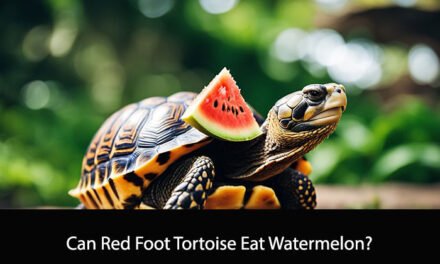Russian tortoises are popular pets due to their small size, docile nature, and easy care requirements. As herbivores, they require a diet of fresh vegetables and fruits, but not all fruits and vegetables are safe for them to eat. One common question that many tortoise owners have is whether or not their pet can eat cucumbers.
Cucumbers are a popular vegetable that are often included in human diets due to their high water content and refreshing taste. However, when it comes to feeding them to Russian tortoises, it’s important to know whether or not they are safe and nutritious for these animals. In this article, we will explore the question of whether or not Russian tortoises can eat cucumbers, and provide information on the nutritional value of cucumbers and how to properly feed them to your pet tortoise.
Understanding Russian Tortoises
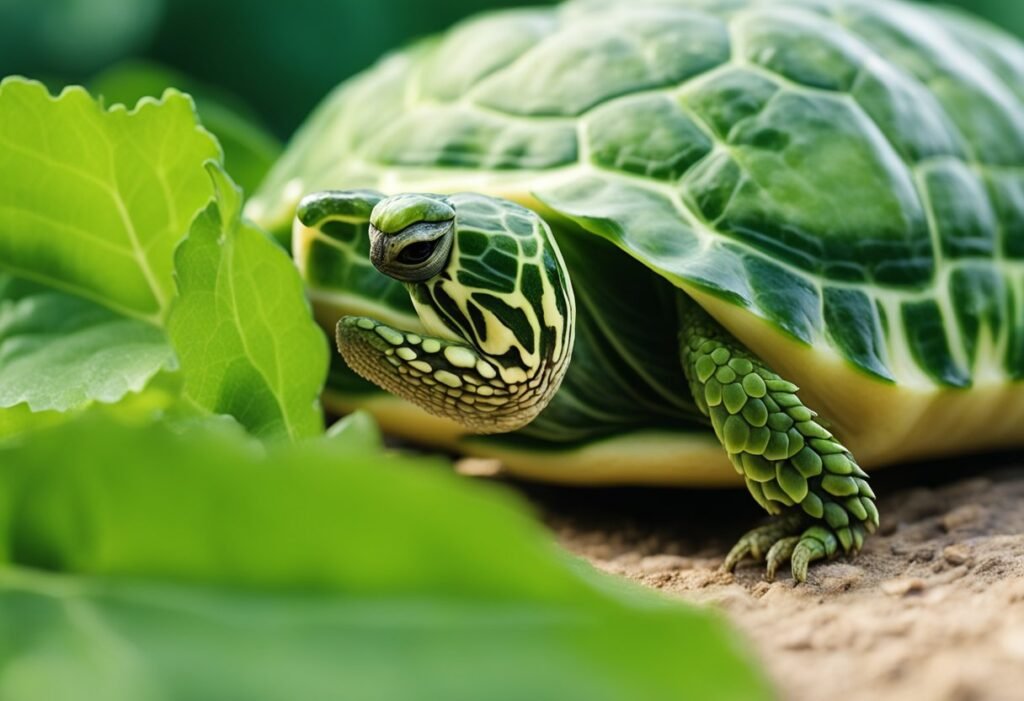
Russian Tortoises, also known as Horsfield’s tortoise, are a popular pet reptile species. These tortoises are native to Central Asia, where they live in arid and semi-arid habitats. They are hardy and adaptable, making them a great choice for first-time tortoise owners.
Russian Tortoises are small compared to other tortoise species, typically reaching 6 to 10 inches in length. They are herbivores, and their natural diet consists of various plants, including grasses, weeds, and leafy greens.
It is important to note that Russian Tortoises have specific dietary requirements, and their diet should be carefully monitored. Feeding them the wrong foods can lead to health problems, such as digestive issues and metabolic bone disease.
In addition to their diet, Russian Tortoises also require a specific type of habitat. They need a dry and warm environment with access to UVB lighting. Without proper lighting, they can develop shell deformities and other health issues.
Overall, Russian Tortoises are fascinating and rewarding pets, but they require proper care and attention to thrive. As responsible pet owners, it is our duty to ensure they receive the right diet, habitat, and care.
Dietary Needs of Russian Tortoises
Russian tortoises are herbivores and have specific dietary needs to maintain their health. As responsible pet owners, we must ensure that we provide our tortoises with a balanced diet that meets their nutritional requirements.
The primary component of a Russian tortoise’s diet should be dark, leafy greens such as kale, collard greens, and mustard greens. These greens are high in calcium and fiber, which are essential for a tortoise’s digestive system and overall health.
In addition to dark leafy greens, Russian tortoises can also eat a variety of vegetables such as carrots, squash, and bell peppers. It is important to note that while cucumbers are safe for tortoises to eat, they do not provide much nutritional value and should not make up a significant portion of their diet.
It is crucial to avoid feeding your tortoise high-protein foods such as meat, eggs, and dairy products. These foods can cause health problems and should be avoided.
In summary, a balanced diet for a Russian tortoise should consist of dark, leafy greens, a variety of vegetables, and a limited amount of fruits. By providing your tortoise with a well-rounded diet, you can ensure that they live a healthy and happy life.
Can Russian Tortoises Eat Cucumbers?
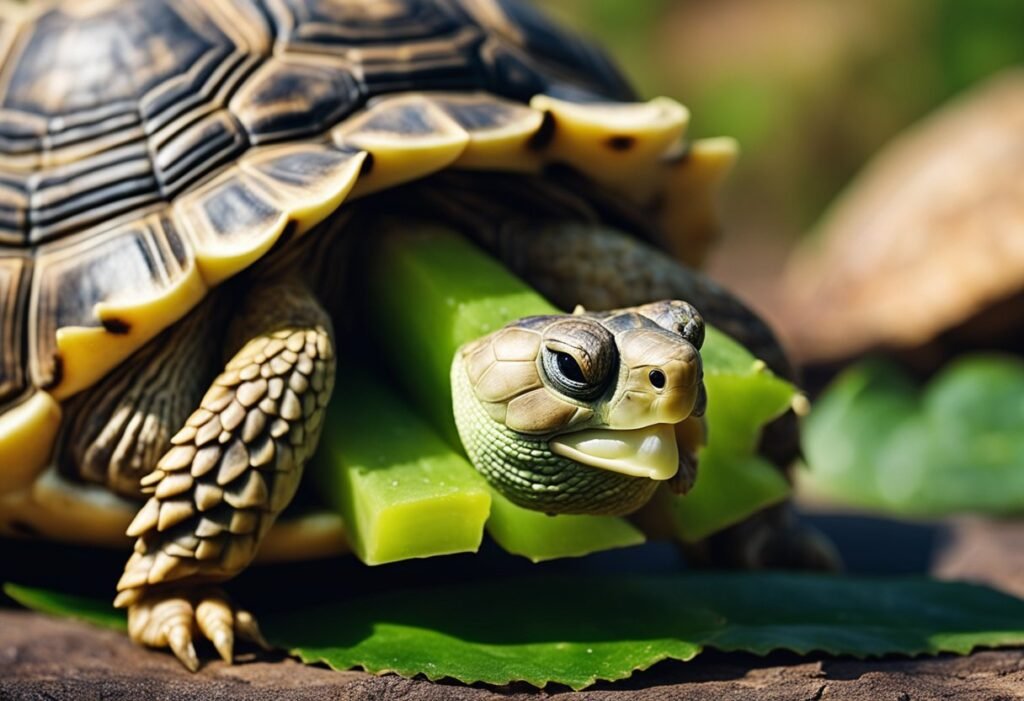
Cucumbers are a popular vegetable that many people enjoy. As tortoise owners, we may wonder if cucumbers are a safe and healthy food for our Russian tortoises to eat.
The good news is that cucumbers are safe for Russian tortoises to eat in moderation. They are a good source of hydration and contain some essential vitamins and minerals.
However, it’s important to note that cucumbers should not make up the majority of a Russian tortoise’s diet. They should be fed as a treat in addition to a balanced diet of leafy greens, vegetables, and occasional fruits.
When feeding cucumbers to your Russian tortoise, it’s important to prepare them properly. Make sure to wash the cucumber thoroughly and remove any seeds or tough skin. You can slice the cucumber into small pieces or even grate it for easier digestion.
In summary, Russian tortoises can eat cucumbers as a treat in moderation. However, they should not be the main component of their diet and should be prepared properly before feeding.
Effects of Cucumbers on Russian Tortoises
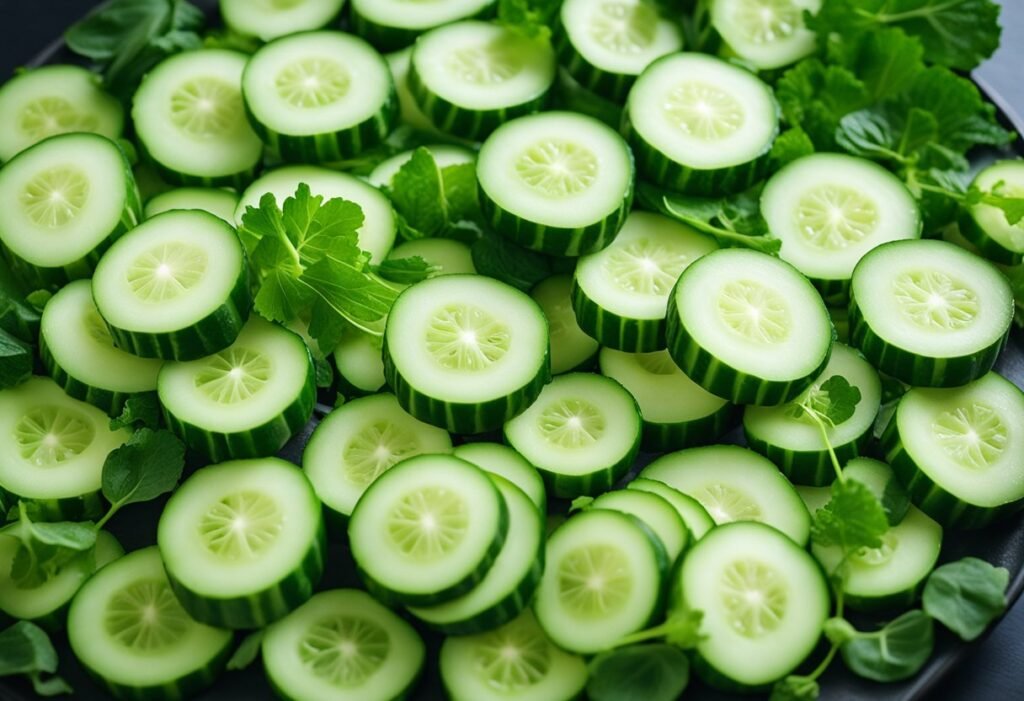
Cucumbers are a popular vegetable that many people enjoy eating. However, when it comes to feeding cucumbers to Russian tortoises, there are some things to consider.
Firstly, cucumbers are high in water content and low in nutritional value. While they may provide some hydration to your tortoise, they should not be relied upon as a primary food source. It is important to provide a balanced diet that includes a variety of vegetables, fruits, and protein sources.
Additionally, cucumbers contain a small amount of oxalates, which can bind to calcium and prevent it from being absorbed by the tortoise’s body. This can lead to metabolic bone disease, which is a serious condition that can cause deformities and even death.
If you do choose to feed cucumbers to your Russian tortoise, it should be offered in moderation as a treat rather than a staple food item. It is also important to remove any uneaten cucumber from the enclosure to prevent spoilage and the growth of harmful bacteria.
In summary, while cucumbers can be fed to Russian tortoises, they should not be a primary food source and should be offered in moderation. A balanced diet that includes a variety of vegetables, fruits, and protein sources is essential for the health and well-being of your tortoise.
Alternatives to Cucumbers in the Diet
While cucumbers are a great source of hydration and nutrition for Russian tortoises, it’s important to provide a varied diet to ensure they get all the necessary nutrients. Here are some alternatives to cucumbers that you can add to your tortoise’s diet:
Leafy Greens
Leafy greens such as kale, collard greens, and dandelion greens are excellent sources of fiber, vitamins, and minerals. They are low in calories and can be fed daily. Make sure to wash them thoroughly before feeding them to your tortoise.
Vegetables
Vegetables such as carrots, squash, and sweet potatoes are also great sources of vitamins and minerals. They can be fed in moderation as they are higher in calories than leafy greens. Make sure to cut them into small pieces to prevent choking.
Fruits
Fruits such as strawberries, raspberries, and melons can be fed as occasional treats. They are high in sugar and should be fed in moderation. Do not feed citrus fruits as they can cause digestive issues.
Commercial Pellets
Commercial pellets are specially formulated to provide all the necessary nutrients for tortoises. They can be fed as a supplement to a varied diet. Make sure to choose a high-quality brand and follow the feeding instructions on the package.
Remember to always provide fresh water and a calcium supplement to ensure your Russian tortoise stays healthy and happy.
Feeding Cucumbers to Russian Tortoises: Best Practices
When it comes to feeding cucumbers to Russian tortoises, there are a few best practices to keep in mind. While cucumbers can be a healthy addition to a tortoise’s diet, it’s important to make sure you’re offering them in the right way.
First, it’s important to note that cucumbers should not be the main staple of a Russian tortoise’s diet. These animals require a varied diet that includes a mix of leafy greens, vegetables, and fruits. Cucumbers can be a healthy addition to this mix, but they should not make up the majority of the tortoise’s diet.
When offering cucumbers to your Russian tortoise, it’s best to slice them into small pieces. This will make it easier for the tortoise to eat and digest them. You can also remove the seeds, as some tortoises may have trouble digesting them.
It’s also important to make sure the cucumbers you offer are fresh and free of any pesticides or other harmful chemicals. If possible, try to offer organic cucumbers to your tortoise.
In addition to cucumbers, you can offer your Russian tortoise a variety of other vegetables and fruits, such as kale, collard greens, carrots, and apples. By offering a varied diet, you can help ensure your tortoise is getting all of the nutrients they need to stay healthy.
Overall, feeding cucumbers to Russian tortoises can be a healthy and enjoyable addition to their diet, as long as you follow these best practices.
Conclusion
In conclusion, Russian tortoises can eat cucumbers, but they should not be the main staple of their diet. While cucumbers are a good source of hydration and some nutrients, they lack the necessary calcium and protein that tortoises need to thrive.
It is important to provide a balanced diet for your Russian tortoise that includes a variety of vegetables, fruits, and protein sources such as insects and grasses. Cucumbers can be given as an occasional treat or as a way to help hydrate your tortoise, but they should not make up a significant portion of their diet.
When feeding cucumbers to your tortoise, it is important to wash them thoroughly and cut them into small, bite-sized pieces. Avoid feeding your tortoise any cucumber that is overripe or has been treated with pesticides or chemicals.
Overall, while cucumbers can be a healthy addition to a Russian tortoise’s diet, they should not be relied upon as a primary food source. By providing a varied and balanced diet, you can help ensure that your tortoise stays healthy and happy for years to come.
Frequently Asked Questions
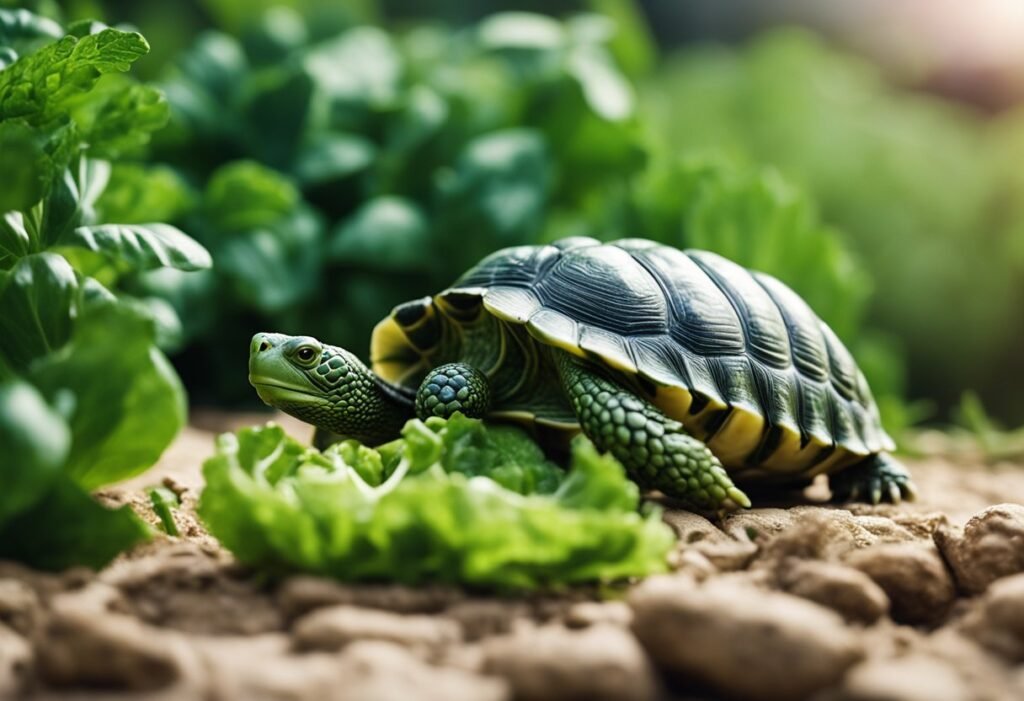
What vegetables can tortoises eat?
Russian tortoises can eat a variety of vegetables, including dark leafy greens like kale and collard greens, as well as vegetables like squash, pumpkin, and bell peppers. It’s important to feed them a variety of vegetables to ensure they get all the nutrients they need.
What fruits can tortoises eat?
Tortoises can eat fruits, but they should be fed in moderation. Some good options include strawberries, raspberries, and blueberries. Avoid feeding them citrus fruits or fruits with high sugar content, like bananas.
Can tortoises eat carrots?
Yes, tortoises can eat carrots, but they should be fed in moderation. Carrots are high in sugar, so too many can lead to health problems. It’s important to feed them a variety of vegetables to ensure they get all the nutrients they need.
Can tortoises eat zucchini?
Yes, zucchini is a good vegetable option for tortoises. It’s low in sugar and high in nutrients like vitamin C and potassium. Just make sure to cut it into small pieces to make it easier for them to eat.
Can tortoises eat celery?
Yes, tortoises can eat celery, but it should be fed in moderation. Celery is high in fiber, which can be difficult for tortoises to digest in large quantities. It’s important to feed them a variety of vegetables to ensure they get all the nutrients they need.
What foods are poisonous to Russian tortoises?
Some foods that are poisonous to tortoises include avocado, rhubarb, and chocolate. It’s important to research any new foods before feeding them to your tortoise to ensure they are safe.





